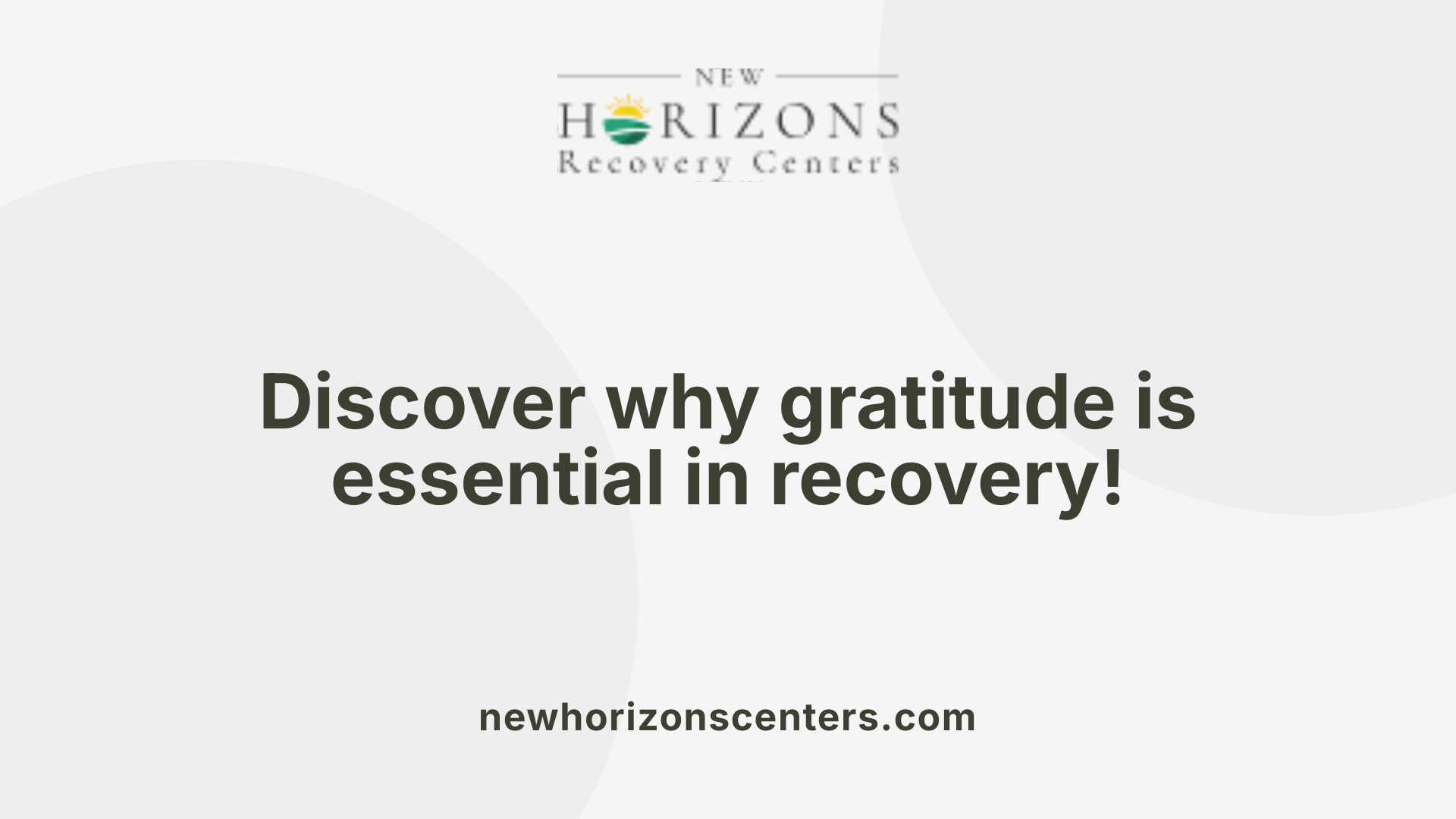The Transformative Role of Gratitude
In the challenging journey of addiction recovery, every tool and technique that can aid in achieving and maintaining sobriety is invaluable. One such powerful tool is gratitude, a practice that not only shifts focus from negativity but also strengthens mental resilience and emotional well-being. This narrative explores how gratitude can significantly impact recovery, offering actionable strategies, research-backed benefits, and insights into its therapeutic potential.
Gratitude: A Cornerstone in Recovery

Why is gratitude important in addiction recovery?
Gratitude is vital in addiction recovery for several compelling reasons. First, it fosters a positive mindset, helping individuals pivot from feelings of negativity to focus on optimism. This shift is crucial for overcoming challenges and can significantly enhance emotional resilience. By practicing gratitude, individuals are better equipped to cope with setbacks, as it reduces stress and anxiety—two major triggers for substance use.
Expressing gratitude also strengthens relationships, nurturing a supportive environment that is essential during recovery. Strong social connections can facilitate emotional healing, making it easier to navigate the complexities of sobriety. Engaging in gratitude practices, such as maintaining a daily gratitude journal or participating in group discussions, encourages individuals to reflect on their progress and recognize positive experiences.
Emotional and psychological benefits
The emotional and psychological benefits of gratitude are profound. Studies indicate that practicing gratitude correlates directly with lower levels of depression and anxiety. Participants in gratitude interventions report increased happiness, lower negative emotions, and improved overall life satisfaction. Notably, individuals practicing gratitude show enhanced resilience—more than 70% of those recovering from mental health issues note gratitude as a source of strength.
Furthermore, gratitude has been linked to improved physical health, including better sleep quality and immune function. These benefits contribute to a more fulfilling recovery experience, helping individuals maintain motivation and commit to avoiding relapse. By embracing gratitude, recovering individuals can better navigate the challenges they face and foster a sense of hope and positivity throughout their journeys.
The Transformative Effects of Gratitude

How does practicing gratitude change your life?
Practicing gratitude can profoundly change your life by enhancing overall happiness and fostering a more positive outlook. Numerous studies indicate that individuals who regularly express gratitude experience better mental health and reduced risks of depression.
Methods like maintaining a gratitude journal, writing thank-you notes, or simply counting blessings can effectively reinforce these benefits. For instance, research from the University of Berkeley found that individuals who engaged in gratitude writing reported significantly better mental health outcomes several weeks later. In addition to mental health, gratitude is linked to improved physical health, showcasing benefits such as enhanced sleep quality and cardiovascular health.
Benefits on mental health and life changes
- Enhanced Emotional Well-Being: Regularly practicing gratitude reduces symptoms of anxiety and depression. Individuals actively engaging in gratitude have reported a 25% decrease in feelings of depression and greater life satisfaction.
- Improved Relationships: Gratitude strengthens relationships by nurturing connections. This is particularly vital in recovery, as supportive relationships can foster a healthier environment.
- Positive Coping Mechanisms: Gratitude encourages individuals to focus on their progress and achievements rather than dwelling on past mistakes, which is crucial during recovery.
Physical health advantages
- Improved Sleep Quality: Grateful individuals tend to sleep better, as gratitude fosters a peaceful mindset at bedtime.
- Health Benefits: Studies indicate that gratitude can enhance overall physical well-being, leading to lower blood pressure and improved immunity. Robert Emmons highlights that gratitude can even reduce pain perception.
- Effective Stress Management: Practicing gratitude contributes to emotional well-being and serves as a protective factor against stress-related health challenges.
Ultimately, cultivating gratitude not only enriches personal well-being but also strengthens relationships and improves coping mechanisms in the face of adversity.
Implementing Gratitude: Practical Strategies

What are practical techniques for incorporating gratitude into daily life?
Incorporating gratitude into daily life can be significantly enhanced by understanding it as a practice that positively influences brain function and overall well-being. One effective approach is to utilize the Four A's of Gratitude: Attention, Acknowledgment, Appreciation, and Action.
- Attention: Consciously focus on the positive aspects of life. This mindfulness can help counteract negative thinking patterns and make individuals more aware of the good things around them.
- Acknowledgment: Recognize and appreciate the contributions of others in personal achievements. This acknowledgment fosters stronger connections and community support, crucial in recovery.
- Appreciation: Allow oneself to genuinely feel gratitude. Reflecting on what one is thankful for deepens the emotional experience, creating a sense of fulfillment.
- Action: Express gratitude through tangible actions. This could involve writing thank-you notes, sharing kind words, or volunteering, reinforcing an active commitment to a grateful mindset.
How can these practices be integrated into everyday routines?
Regular practices of gratitude can easily be incorporated into daily life. Here are some tips:
- Gratitude Journaling: Spend a few minutes each evening writing down three things one is grateful for. This reinforces positive thinking and provides clarity.
- Mindful Reflection: Allocate time each week to reflect on recovery progress and achievements. This helps in acknowledging growth and cultivating a positive mindset.
- Daily Affirmations: Verbally express appreciation for oneself and others. This enhances emotional well-being and strengthens relationships.
- Community Sharing: Engage in group discussions or support circles where gratitude is a regular topic, fostering collective healing and encouragement.
By weaving these techniques into everyday routines, individuals not only enrich their daily lives but also build a resilient framework that supports mental and emotional well-being in their journey of recovery.
Understanding the Four A's of Gratitude

What are the Four A's of gratitude?
The Four A's of Gratitude provide a framework for cultivating gratitude more effectively:
- Attention: This involves consciously noticing the positive aspects of our experiences and the contributions of others. By focusing our attention on what is good, we open ourselves to a brighter outlook.
- Acknowledgment: Once we have noticed the positives, the next step is recognizing and verbalizing their impact on our lives. This can be as simple as expressing thanks to someone who has helped you.
- Appreciation: Going deeper, appreciation fosters feelings of thankfulness and values the goodness around us. It encourages us to reflect on our blessings and understand their significance.
- Action: This final A translates our gratitude into tangible expressions, such as writing gratitude letters or performing acts of kindness. These actions not only reinforce our connections with others but also enhance our overall well-being.
Enhancing the gratitude practice
To deepen the impact of gratitude, consider the following techniques:
- Keep a gratitude journal: Write down daily entries that include three positive things you experienced. This can improve your mental health over time.
- Engage in reflection: Dedicate time weekly to reflect on your recovery journey, reinforcing a commitment to positive change.
- Share your gratitude: Express appreciation to others, which not only lifts their spirits but also strengthens your own positive mindset.
Empirical Evidence Supporting Gratitude Practices

Research studies on gratitude's impact
Numerous studies have demonstrated the powerful effects of gratitude on mental health and well-being. Research published in Psychological Science revealed that individuals who practiced gratitude experienced a significant 25% decrease in feelings of depression. Another comprehensive analysis showed higher happiness levels among those who maintained gratitude journals, with participants reporting a 10% boost in overall happiness after just six weeks.
A study from the University of Berkeley concluded that writing gratitude letters helped participants improve their mental health outcomes, showcasing the long-term positive impacts of gratitude practices, especially for those receiving counseling.
Long-term mental health benefits
Beyond immediate mood enhancements, practicing gratitude establishes mental health resilience. For instance, a survey noted that over 70% of individuals recovering from mental health challenges felt stronger during their journey as gratitude guided their focus towards progress and achievement rather than setbacks.
Moreover, participants who engage in gratitude exercises report reduced symptoms of anxiety and depression. Research indicates that individuals practicing gratitude also experience enhanced sleep quality, improved relationships, and a greater overall sense of well-being. With gratitude being emphasized in recovery frameworks like Alcoholics Anonymous, it is clear that its consistent practice serves as a cornerstone for emotional wellness and stability during recovery.
Embracing a Grateful Heart
Gratitude stands out as a beacon of hope and resilience on the path of recovery. By focusing on the positive aspects of life, writing down one's blessings, and openly expressing thanks, individuals can cultivate a nurturing environment for recovery. Through both personal practice and community support, gratitude not only alleviates emotional and physical burdens but also paves the way for a more fulfilled and sober life. Incorporating gratitude into daily routines can turn recovery into a joyful journey of self-discovery and renewal.
References
- 7 Ways to Practice Gratitude in Recovery
- 5 Ways Gratitude Can Help Recovery - Herren Wellness
- Gratitude and Forgiveness: The Cornerstones of the Recovery Process
- Untitled
- 5 Ways Gratitude Can Benefit Your Recovery - Legacy Healing Center
- Showing Gratitude in Addiction Recovery - Lifeskills South Florida
- The Importance of Practicing Gratitude and Celebrating Small Victories
- 9 Things to Be Grateful for in Recovery | Addictions.com





-ink.jpeg)
-ink.jpeg)
